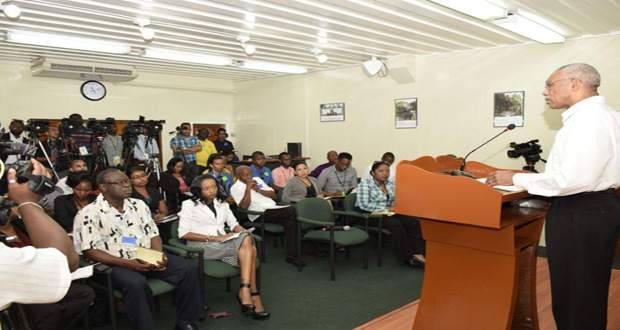
GUYANA has been too dependent on traditional export products and, as a result, the economy has suffered. In fact, President David Granger yesterday declared that his government inherited an anemic economy. Speaking at his first press conference at the Ministry of the Presidency, Granger responded to question of a slowdown in the country’s economy.“Generally, the commodities we depend on most have underperformed and the underperformance was noted since 2014,” the President told reporters.
The President said his government “took over some troubled companies” making specific reference to the Guyana Sugar Corporation (GUYSUCO) and the Guyana Power and Light Corporation (GPL).
“…so when we speak about slowdown, the slowdown is perhaps a year or more old. It is not a recent slowdown, it has been taking place over a very long period of time,” Granger stated.
“The slowdown is not a result of May 11th; if you look back at what has taken place in 2014 you’d see that bauxite prices flattened out, gold prices were dropping, sugar production was falling and generally, the more productive sectors, and don’t forget Guyana has not been able to uproot itself from what is called the ‘six sisters’ – rice, sugar, gold, diamond, bauxite and timber,” the President said.
Guyana, he said, has been exporting the same things over the past 100 years and many of the products “started to show signs of anemia in 2014.” Some, he said, were subject to world market prices.
According to him, many persons have been leaving the gold industry because of low prices for gold, with a similar situation happening now in the rice industry.
In 2014, the Economic Commission for Latin America and the Caribbean projected a 4.5 per cent growth rate for Guyana, the highest for the Caribbean and the eleventh in the entire Latin America. Figures were released in ECLAC’s projections for Latin America and Caribbean economies which the body said would have experienced an average growth of 2.2 per cent in 2014 and was affected by the weakness in external demand, less dynamic domestic demand, insufficient investment, and limited room for implementing policies to result in growth.
The economic slowdown observed in the last quarter of 2013 persisted during the first months of 2014, meaning that the region will grow less than it did the previous year.
“Macroeconomic policies have to take into account each country’s specific vulnerabilities. Without a doubt, it is important in all cases to increase investment and productivity to guarantee structural change with equality in the medium term. Both factors are key challenges for the economic sustainability of development, especially in the current context,” Alicia BÁrcena, ECLAC’s Executive Secretary said.
JOB CREATION
Meanwhile, President Granger stressed that education is key to job creation and explained that there is no point promising jobs when the requisite skills do not exist.
“Essentially, it has always been an argument that the education system has to be the basis for employment. It is no point going out and promising people jobs when they do not have the skills or education level to support the jobs that you want to provide,” said President Granger.
He told reporters that government’s aim is to get more children to remain in schools given that Guyana has a very high rate of school drop outs. “It is about 500 students a month in the primary and secondary schools…and we have embarked on this programme – Every Child in School (ECIS).”
The President added that Government’s initiative to provide those vulnerable with assistance is also critical to the success of the ECIS programme.
“…that is one of the reasons we are providing school buses, boats and bicycles, the three Bs…to keep children in school. If people can’t afford transportation, we will find ways of getting children to school,” he assured.
Noting that the education system is most important, President Granger said: “We feel that if we can keep children in school they will emerge literate and numerate and make it easier for us to employ them.”
Additionally, the President said it is government’s intention to encourage more indigenous people, particularly youth who may have dropped out of school to get into youth empowerment programmes so that they can utilize their “skills” in their communities. He made specific mention of agro-processing skills. Granger said he does not want a situation where indigenous people are taken from their communities for training in the city for example and after the training they return to their homes but cannot utilise their acquired skills there.
“We want to give them more appropriate skills and the Ministry of Indigenous People’s Affairs is re-launching the Youth Apprenticeship and Entrepreneur programme which can give them the type of skills that they can use in their communities,” the President added.
He pointed to cases of many young people in hinterland communities leaving school to “drift into the mining communities or drift over the border.”
“…but we feel we can keep them in their communities if we provide agro- processing, that is to say if they use cassava, sweet potato, peanuts…they can start selling peanut butter, cassava bread…so these are the means we hope to employ to create jobs.”
The President stressed the importance of keeping young people in schools and said the 2016 budget can hopefully cater to rewarding parents for keeping their children in schools. “Maybe in next year’s budget we can provide some facility instead of the school transport voucher which will reward parents who keep their children in school.”
Advising that keeping children away from Primary school is against the law, the President said: “We don’t want to put anybody in jail…so we will encourage parents to keep their children in schools.”
This will ensure that, in years to come, we would have a more literate population that is better employed in developmental projects, the President told reporters.
By Ariana Gordon




